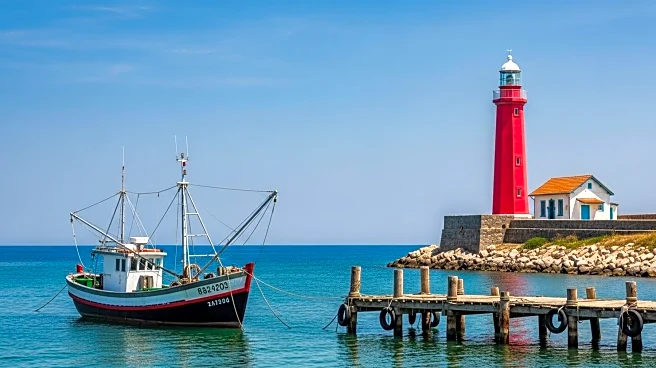What's Happening?
The Suffolk County Legislature has unanimously passed the 'working waterfront' bill, known as Introductory Resolution 1520, aimed at preserving commercial waterfront properties for marine-related industries. This legislation allows property owners to apply for conservation easements through a newly established 17-member Working Waterfront Committee. The bill seeks to protect industries such as aquaculture, marine repair, fishing, and boating from being repurposed for non-marine uses. The legislation is part of the county's $9.5 million capital project funding plan for 2026-28. Suffolk County is home to nearly 3,000 marine-related businesses, employing over 38,000 people, which constitutes 6.1% of the county's economy. The bill follows a public hearing held on August 5, where it received overwhelming support.
Why It's Important?
The passage of the 'working waterfront' bill is significant for Suffolk County's economy and cultural heritage. By safeguarding marine-related industries, the legislation helps maintain employment and income sources vital to the county. The fishing and shellfish industries, which are integral to the local economy and tourism, stand to benefit from this protection. The bill also addresses the pressures faced by commercial waterfront properties to convert to residential developments, which could undermine the availability of essential maritime facilities. This proactive measure ensures that these properties remain dedicated to marine-dependent uses, supporting local businesses and providing resilience against environmental challenges such as rising sea levels and coastal storms.
What's Next?
With the bill's approval, the next steps involve the implementation of the conservation easements by the Working Waterfront Committee. Property owners will be able to apply for these easements to ensure their properties remain dedicated to marine uses. The county will continue to engage with local businesses and landowners to address challenges and facilitate the preservation of waterfront properties. The legislation is modeled after similar successful initiatives in Maine, which have preserved portions of the state's working shoreline. Stakeholders, including local government officials and community leaders, are expected to monitor the impact of the bill and advocate for further measures to support the marine industries.
Beyond the Headlines
The 'working waterfront' bill highlights broader implications for environmental conservation and sustainable development. By preserving marine-related properties, the legislation contributes to the protection of natural habitats and biodiversity. It also underscores the importance of balancing economic development with environmental stewardship. The bill's focus on conservation easements reflects a growing trend towards sustainable land use practices that prioritize long-term ecological health over short-term economic gains. This approach may serve as a model for other regions facing similar pressures on their waterfront properties.











